
Deputy Minister of Tourism of Kurdistan Province; It can almost be said that the accommodation capacity of this province was completed during last week's holidays. Even now, we are witnessing the activity of accommodation centers in the province with an occupancy rate of about 70%.
Create: Sep 6, 2020 Edit: Sep 6, 2020 Regional News
"Ali Malmir" General Manager of Cultural Heritage, Tourism and Handicrafts of Hamadan Province; The construction of a hotel near Ali Sadr Cave is an obstacle to world registration and has no justification for UNESCO. The General Directorate of Cultural Heritage and Tourism opposed the construction of the hotel and legal action was taken, but the operation license was issued by Dehyari.
Create: Sep 6, 2020 Edit: Sep 6, 2020 Regional News
Passengers flying by Fly Dubai from September 1 to November 30 will be covered by Covid19 free treatment. This coverage includes health and quarantine costs for travelers diagnosed with the disease during the trip and is valid for 31 days from the time of the flight. Medical expenses will be up to 150,000 Euros and up to 100 Euros for each day of quarantine for 14 days.
Create: Sep 6, 2020 Edit: Sep 9, 2020 International News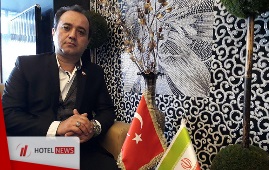
"Behzad Shojaei" reported in an interview with Hotel News; During negotiations with the CEO of the Asia Exhibition Company and the Turkish parties, the offer of this entry permit was made, which was also welcomed. It was decided that the issue of issuing entry permits to the city of Van for Iranian specialized centers and visitors in this exhibition will be reviewed and the final result will be announced. Restrictions and obstacles should not lead to the closure of tourism activities, but can be avoided with reasonable solutions to these challenges so that the tourism industry does not suffer from operational paralysis.
Create: Sep 5, 2020 Edit: Sep 6, 2020 Regional News
Technique 181 Understand When to Mention Your Hotel’s Name When Responding to Consumer Blogs; When responding to a negative online review, the name of the hotel should never be mentioned in the response. Con- versely, when responding to a positive online review, the name of the hotel should always be mentioned in the response. Technique 182 Understand When to Use “I” or “We” When Responding to Consumer Blogs; When responding to a negative online review, the hotel manager should use ‘I’ in the online response (e.g., ‘I will look into this issue’). The use of the word “I” signals owner- ship of the problem and resolution. On the other hand, when responding to a positive online review, the manager should use ‘we’ to spread the credit among the staff (e.g., ‘we are very glad that you enjoyed your stay’). Technique 183 Paraphrase the Problem When Responding to Negative Consumer Blogs; When responding to a negative online review, the hotel manager should paraphrase the guest’s concern in the online response. Such paraphrasing communicates to all those read- ing the response that the hotel has good listening skills. Technique 184 Include a ‘Relate’ Statement When Responding to Negative Consumer Blogs; When responding to a negative online review, the hotel manager should attempt to include a statement detailing how s/he can relate to the problem being communicated by the guest. Including a ‘relate’ statement communicates to all those reading the response that the hotel is empathetic to guests’ concerns. Technique 185 Require One New Idea Per Week; At every weekly management meeting, one manager should be required to share an innovative idea with the group that has never been attempted in the hotel. Technique 186 Graph Guest Problems According to Frequency and Seriousness; Guest problems should be tracked and plotted on a graph according to their frequency and seriousness. A cross-depart- mental team of 6–8 line-level associates and managers should be created to derive strategies for fixing the most pressing problems based upon frequency and/or seriousness. Technique 187 Text Mine Consumer Blogs for Trends; Hotel management should contract with a 3rd party ven- dor (e.g., Revinate) so that consumers’ blog postings can be analyzed for trends. Many of these 3rd party vendor products also enable management to monitor trends in competitors’ blog postings. Technique 188 Data Mine the Centralized Reservations System for Trends; Hotel management should data mine its centralized res- ervation system to identify non-obvious patterns and trends in guests’ habits and preferences. The results of such data mining can be used to better serve guests, but also to build an enhanced understanding of proper timing and placement of marketing messages. Chain affiliated hotels likely already have data mining services available to them. Managers at inde- pendent hotels can be taught some basic data mining func- tions by a consultant. The extent of data mining capabilities offered by 3rd party management companies appears to vary widely across the industry. Technique 189 Utilize the Front Desk as a Listening Post; Front desk associates should consider their work area a “listening post” from which they can overhear conversations between guests. Many guests may be reluctant to actively voice complaints to hotel staff, but discuss various issues among themselves (e.g., the ice machine was too noisy; the sidewalks leading to the parking lot were too icy). Such information should be entered into the logbook and denoted as “listening post feedback.”
Create: Sep 5, 2020 Edit: Oct 18, 2020 Hotel Management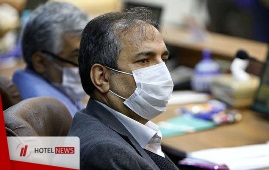
Jamshid Hamzehzadeh, President of the Iranian Hoteliers Association; Currently, many hotels in the country offer discounts of 50 to 60%, but still do not have customers. The basis for the increase in hotel rates is the annual inflation rate, but even last year, when inflation was announced at 53%, hotels increased their prices by 10 to 15%.
Create: Sep 5, 2020 Edit: Sep 5, 2020 Regional News
"Vali Teymouri", the country's Deputy Minister of Tourism, stated; Iran's tourism industry grew by more than 10 percent in 1998, despite closures and travel bans due to the coronavirus outbreak in the final months of the previous year.
Create: Sep 5, 2020 Edit: Sep 5, 2020 Regional News
"Mohsen Haji Saeed" President of the Tourist Guides Association throughout the country; Unemployment of tour guides is predictable for a year and a half. Unemployment and the problems of tour guides will continue until the vaccine is discovered. Unprecedented unemployment is currently dominating tourist guides, and the government needs to be careful about providing facilities to this group and related laws.
Create: Sep 5, 2020 Edit: Sep 5, 2020 Regional News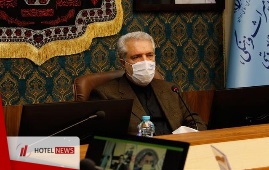
Ali Asghar Monesan, Minister of Tourism; At national level, it is often argued that travel intensifies the corona. Lack of social distance, congestion and not wearing a mask are the main causes of the prevalence and travel has the least impact. In a letter to the President, I have emphasized that if this trend continues, the tourism industry will suffer irreparable damage.
Create: Sep 5, 2020 Edit: Sep 5, 2020 Regional News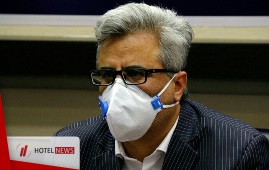
"Vali Teymouri" Deputy Minister of Tourism announced; The details of special support for the tourism industry and handicrafts are mentioned in the minutes of the economic headquarters meeting and there is talk about the place of financing. The final result will be reached in soon with the Vice President for Economic Affairs, which is very crucial. There is no decision to cancel the trip at the Coronavirus National Headquarters, and general managers must defend travel in provincial meetings.
Create: Sep 5, 2020 Edit: Sep 5, 2020 Regional News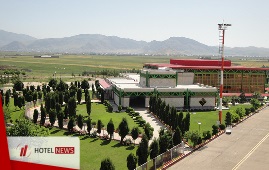
"Ali Kameli," the director of Khorramabad Airport, explained; The festival of public aviation sports and tourism was scheduled to be held at this airport from 18 to 20th of August this year. Due to the prevalence of coronavirus and the red situation in Khorramabad, the festival was postponed until further notice
Create: Sep 3, 2020 Edit: Sep 3, 2020 Regional News
